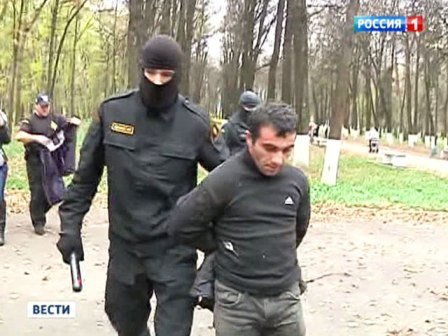
Azerbaijan in 2013: Balancing Between Europe and Russia
Publication: Eurasia Daily Monitor Volume: 11 Issue: 11
By:

A number of important events in Azerbaijan punctuated the past 12 months, and their implications are likely to affect the future development of the country in important ways. Notably, the year 2013 was highlighted by a presidential election, held on October 9, which was swept by the incumbent, Ilham Aliyev. And while the results of the election were largely predicable, the Russian government, nevertheless, took several concrete steps related to the presidential campaign to maximize its own interests. First, the Russian establishment created an unofficial organization—dubbed the “Union of Billionaires”—consisting of Russian oligarchs of Azerbaijani ethnicity (https://en.apa.az/news/182671). The organization’s purpose is generally understood to be a tool by which Moscow is able to put additional pressure on Baku. Over the course of last year, this organization began to ally with local opposition groups, irritating the Azerbaijani government and straining bilateral relations with Russia. Baku feared that Moscow might channel the monetary resources controlled by these billionaires to finance local opposition groups and affect the political system in Azerbaijan or even carry out regime change. However, Russian President Vladimir Putin’s trip to Baku on December 2 smoothed over last year’s tension in the bilateral relationship (see EDM, December 10, 2013). The ostensible deal reached during that visit was advantageous to both sides. In particular, the Kremlin may have received assurances from Baku that Azerbaijani natural gas would not flow to Eastern Europe and would be limited to customers in Southern Europe. Thus, Russia maintained its monopoly of supply to Eastern European markets, while Azerbaijan went ahead with its plans to export its gas through Greece to Italy via the Trans-Adriatic Pipeline, which was selected as the continuation of the nascent Southern Gas Corridor (see EDM, June 27, 2013).
The year 2013 was also crucial for Baku in terms of charting its geopolitical orientation. Last year, Armenia pledged to join the Customs Union (CU) of Russia, Belarus and Kazakhstan, while Georgia initialed an Association Agreement with the European Union during the November Vilnius summit (see EDM, September 5, December 2, 2013). Azerbaijan, on the other hand, has been attempting to maintain a level of neutrality between these two organizations for as long as possible. However, with a further intensification of the struggle between Europe and Russia in the post-Soviet space, this delicate balancing act will be increasingly difficult for Azerbaijan to maintain; the country will eventually need to make a choice. With two close neighbors (Turkey and Georgia) striving for EU accession, one (Armenia) pledging to join the CU, and two (Russia, Kazakhstan) already in it, Azerbaijan is in an uneasy situation. Each of the choices—joining the EU, joining the CU or remaining outside either organization—comes with its own set of benefits and challenges. Nevertheless, last year Baku took a cautious small step in favor of closer relations with Europe by signing a visa facilitation agreement with the EU during the Vilnius summit (see EDM, December 6, 2013).
Meanwhile, the Orxan Zeynalov case and the ensuing pogroms in Moscow’s Biryulyovo suburb further inflamed anti-Kremlin sentiments in Azerbaijan last year. In early October, Zeynalov—an Azerbaijani labor migrant to Moscow—fatally stabbed Russian citizen Yegor Sherbakov. A few days later, a crowd of Russian nationalists provoked anti-migrant riots in Moscow, which led to the destruction of the market in Biryulyovo—a place of employment for migrant laborers from across the post-Soviet space, including Azerbaijan. Zeynalov was quickly arrested, but the humiliating detention and interrogation he underwent in Russian police custody, as well as the media hysteria in Russia caused by the violent incident, sparked a wave of negative statements and feeling in Azerbaijan. Indeed, the massive xenophobic protests in Moscow harmed the perception of Russia in Azerbaijan and reminded many of the 1990s, when extremist Russian nationalists frequently murdered Azerbaijani citizens. Moreover, experts in Baku argued that Zeynalov’s case was being exploited by Moscow as another instrument to press Baku to join the CU. Voices in Azerbaijan asserted that the Zeynalov case would be a prelude for Russia to implement further harsh measures against Azerbaijan, including the introduction of a visa regime—as was the case with Georgia back in 2006–2007 (see EDM, November 18, 2013).
Both Azerbaijani elites and the public appear to believe that the future of the country is connected with Europe and its values. Sooner or later, the country will seek deeper cooperation and integration with Europe—especially because the Russian governance model is increasingly no longer seen as attractive to Azerbaijan (see EDM, November 18, 2013).
Nevertheless, Russia is stronger today than it has been in 20 years. Therefore, for now, Baku cannot ignore Moscow’s interests or easily act against the Kremlin’s will. In 2014, Baku will likely do everything possible not to openly irritate Moscow. Azerbaijan will probably try to maintain a healthy balance between taking steps toward Euro-Atlantic integration versus acting in line with Russian interests. The Azerbaijani government believes that its best strategy is to bide its time until the Custom Union discredits itself or falls apart due to the contradictory interests of its member states (see EDM, November 18, 2013). As a worst-case scenario, Azerbaijan may, in the near term, be forced to agree to sign some kind of political declaration on keeping its economy closely tied to Russian goods and services. Yet, in the meantime, Baku will continue to intensify its projects for delivering Azerbaijani gas to Europe through the Southern Gas Corridor (see EDM, December 6, 2013).
Baku hopes to become a vital partner of the European Union and a major contributor to Europe’s energy security by 2016–2017. The aforementioned energy and pipeline developments of the past year represent a strong step in that direction. Azerbaijan’s government hopes and believes that by achieving this role in the EU-Azerbaijan partnership it will eventually receive the political, economic and, most importantly, military guarantees from Europe that are necessary for Baku to comfortably join more EU-led agreements and projects. Until that time, Azerbaijan will be forced to walk a thin line between its northern neighbor and the West.




